Reflective Analysis: Management, People, and Teams - Key Theories
VerifiedAdded on 2023/06/03
|7
|1251
|483
Report
AI Summary
This report presents a reflective analysis on people, management, and teams within organizations. It assesses key principles and theories underlying strategic people management, emphasizing how their application enhances organizational and individual performance. The report discusses the importance of effective communication and practical problem-solving skills for managing people effectively in various organizational contexts. Furthermore, it reflects on the roles and functions of managers in addressing challenges and risks in a changing environment and proposes a management model to guide future practices. The analysis highlights the need for managers to foster a constructive culture, leverage employee strengths, and adapt to changes in the market environment to improve overall organizational performance. Desklib provides access to this and many other solved assignments for students.
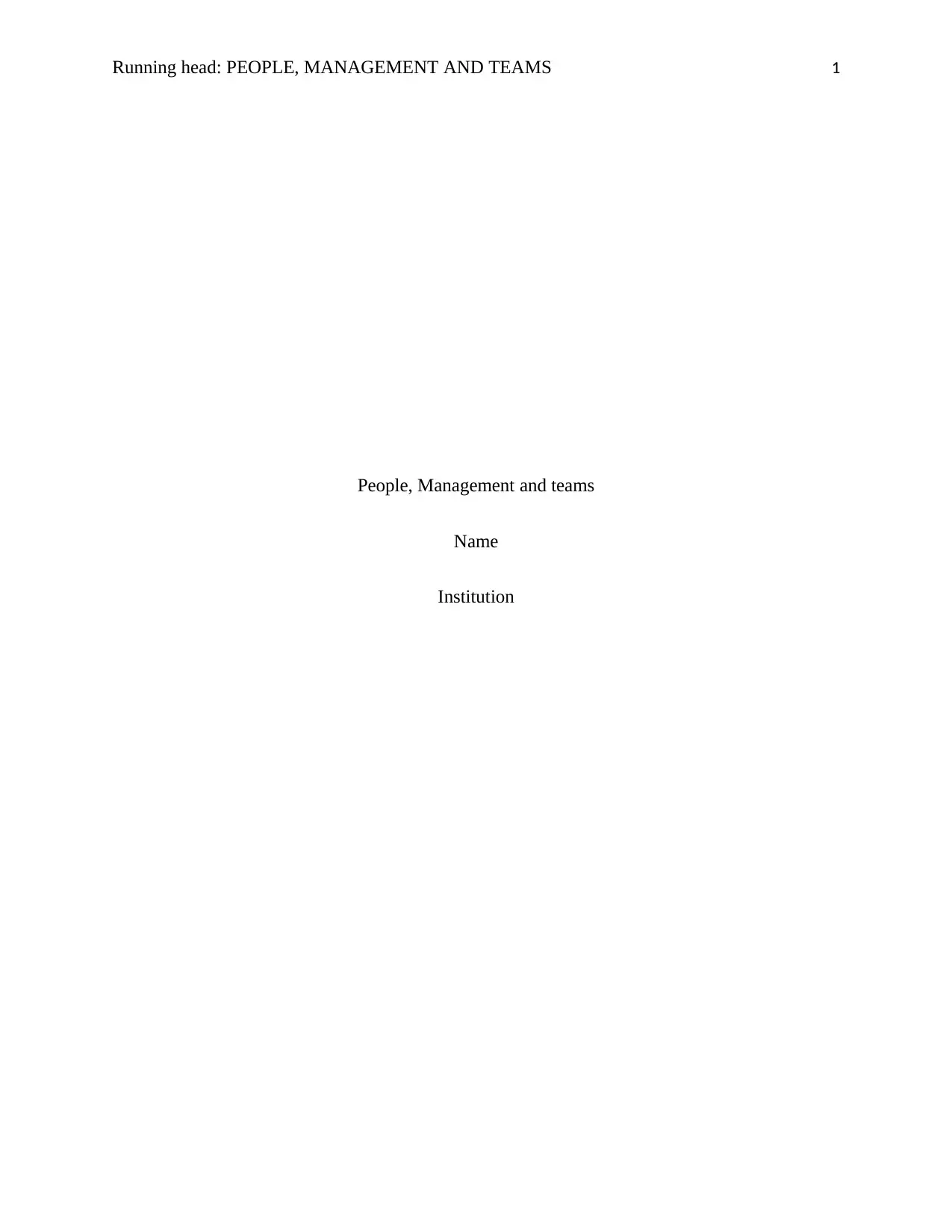
Running head: PEOPLE, MANAGEMENT AND TEAMS 1
People, Management and teams
Name
Institution
People, Management and teams
Name
Institution
Paraphrase This Document
Need a fresh take? Get an instant paraphrase of this document with our AI Paraphraser
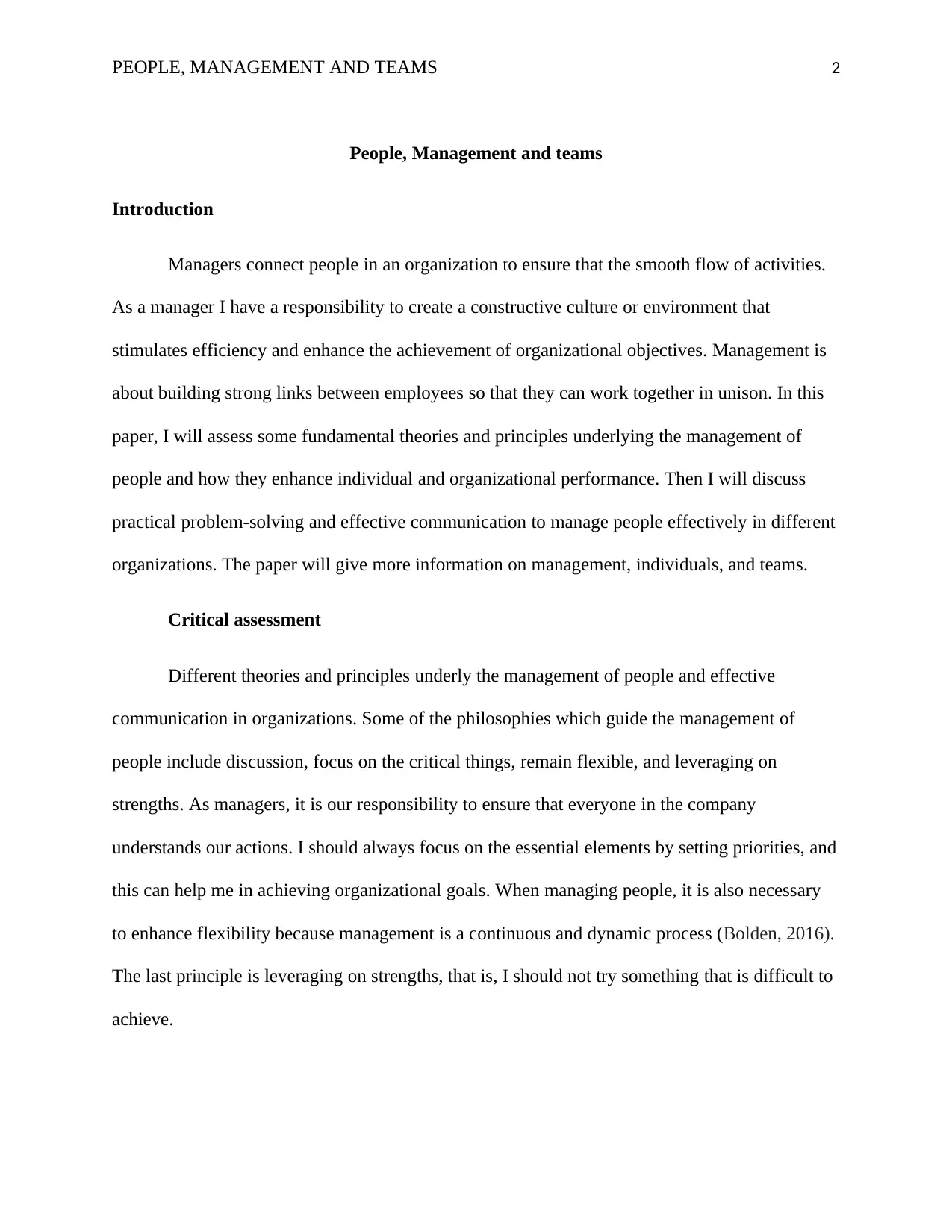
PEOPLE, MANAGEMENT AND TEAMS 2
People, Management and teams
Introduction
Managers connect people in an organization to ensure that the smooth flow of activities.
As a manager I have a responsibility to create a constructive culture or environment that
stimulates efficiency and enhance the achievement of organizational objectives. Management is
about building strong links between employees so that they can work together in unison. In this
paper, I will assess some fundamental theories and principles underlying the management of
people and how they enhance individual and organizational performance. Then I will discuss
practical problem-solving and effective communication to manage people effectively in different
organizations. The paper will give more information on management, individuals, and teams.
Critical assessment
Different theories and principles underly the management of people and effective
communication in organizations. Some of the philosophies which guide the management of
people include discussion, focus on the critical things, remain flexible, and leveraging on
strengths. As managers, it is our responsibility to ensure that everyone in the company
understands our actions. I should always focus on the essential elements by setting priorities, and
this can help me in achieving organizational goals. When managing people, it is also necessary
to enhance flexibility because management is a continuous and dynamic process (Bolden, 2016).
The last principle is leveraging on strengths, that is, I should not try something that is difficult to
achieve.
People, Management and teams
Introduction
Managers connect people in an organization to ensure that the smooth flow of activities.
As a manager I have a responsibility to create a constructive culture or environment that
stimulates efficiency and enhance the achievement of organizational objectives. Management is
about building strong links between employees so that they can work together in unison. In this
paper, I will assess some fundamental theories and principles underlying the management of
people and how they enhance individual and organizational performance. Then I will discuss
practical problem-solving and effective communication to manage people effectively in different
organizations. The paper will give more information on management, individuals, and teams.
Critical assessment
Different theories and principles underly the management of people and effective
communication in organizations. Some of the philosophies which guide the management of
people include discussion, focus on the critical things, remain flexible, and leveraging on
strengths. As managers, it is our responsibility to ensure that everyone in the company
understands our actions. I should always focus on the essential elements by setting priorities, and
this can help me in achieving organizational goals. When managing people, it is also necessary
to enhance flexibility because management is a continuous and dynamic process (Bolden, 2016).
The last principle is leveraging on strengths, that is, I should not try something that is difficult to
achieve.
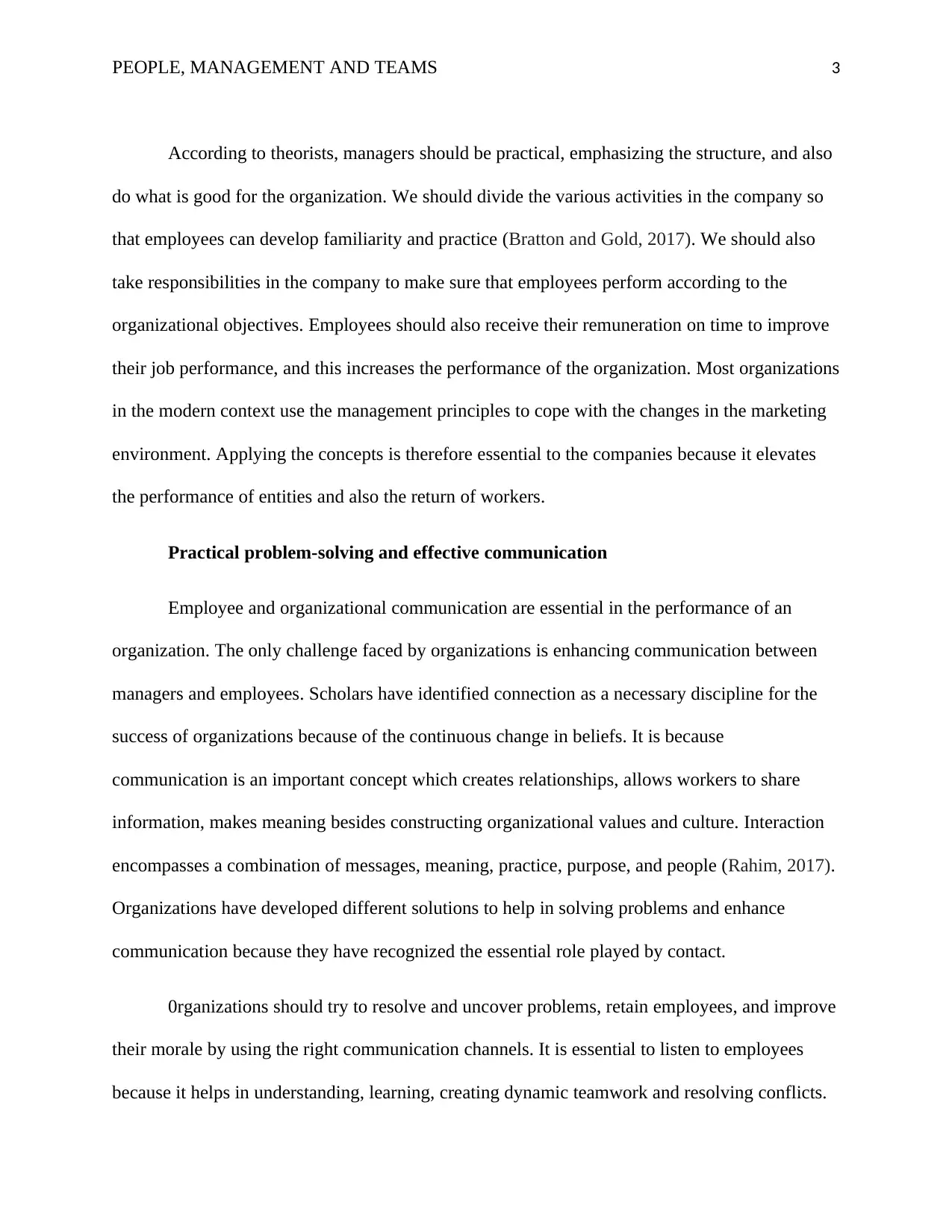
PEOPLE, MANAGEMENT AND TEAMS 3
According to theorists, managers should be practical, emphasizing the structure, and also
do what is good for the organization. We should divide the various activities in the company so
that employees can develop familiarity and practice (Bratton and Gold, 2017). We should also
take responsibilities in the company to make sure that employees perform according to the
organizational objectives. Employees should also receive their remuneration on time to improve
their job performance, and this increases the performance of the organization. Most organizations
in the modern context use the management principles to cope with the changes in the marketing
environment. Applying the concepts is therefore essential to the companies because it elevates
the performance of entities and also the return of workers.
Practical problem-solving and effective communication
Employee and organizational communication are essential in the performance of an
organization. The only challenge faced by organizations is enhancing communication between
managers and employees. Scholars have identified connection as a necessary discipline for the
success of organizations because of the continuous change in beliefs. It is because
communication is an important concept which creates relationships, allows workers to share
information, makes meaning besides constructing organizational values and culture. Interaction
encompasses a combination of messages, meaning, practice, purpose, and people (Rahim, 2017).
Organizations have developed different solutions to help in solving problems and enhance
communication because they have recognized the essential role played by contact.
0rganizations should try to resolve and uncover problems, retain employees, and improve
their morale by using the right communication channels. It is essential to listen to employees
because it helps in understanding, learning, creating dynamic teamwork and resolving conflicts.
According to theorists, managers should be practical, emphasizing the structure, and also
do what is good for the organization. We should divide the various activities in the company so
that employees can develop familiarity and practice (Bratton and Gold, 2017). We should also
take responsibilities in the company to make sure that employees perform according to the
organizational objectives. Employees should also receive their remuneration on time to improve
their job performance, and this increases the performance of the organization. Most organizations
in the modern context use the management principles to cope with the changes in the marketing
environment. Applying the concepts is therefore essential to the companies because it elevates
the performance of entities and also the return of workers.
Practical problem-solving and effective communication
Employee and organizational communication are essential in the performance of an
organization. The only challenge faced by organizations is enhancing communication between
managers and employees. Scholars have identified connection as a necessary discipline for the
success of organizations because of the continuous change in beliefs. It is because
communication is an important concept which creates relationships, allows workers to share
information, makes meaning besides constructing organizational values and culture. Interaction
encompasses a combination of messages, meaning, practice, purpose, and people (Rahim, 2017).
Organizations have developed different solutions to help in solving problems and enhance
communication because they have recognized the essential role played by contact.
0rganizations should try to resolve and uncover problems, retain employees, and improve
their morale by using the right communication channels. It is essential to listen to employees
because it helps in understanding, learning, creating dynamic teamwork and resolving conflicts.
⊘ This is a preview!⊘
Do you want full access?
Subscribe today to unlock all pages.

Trusted by 1+ million students worldwide
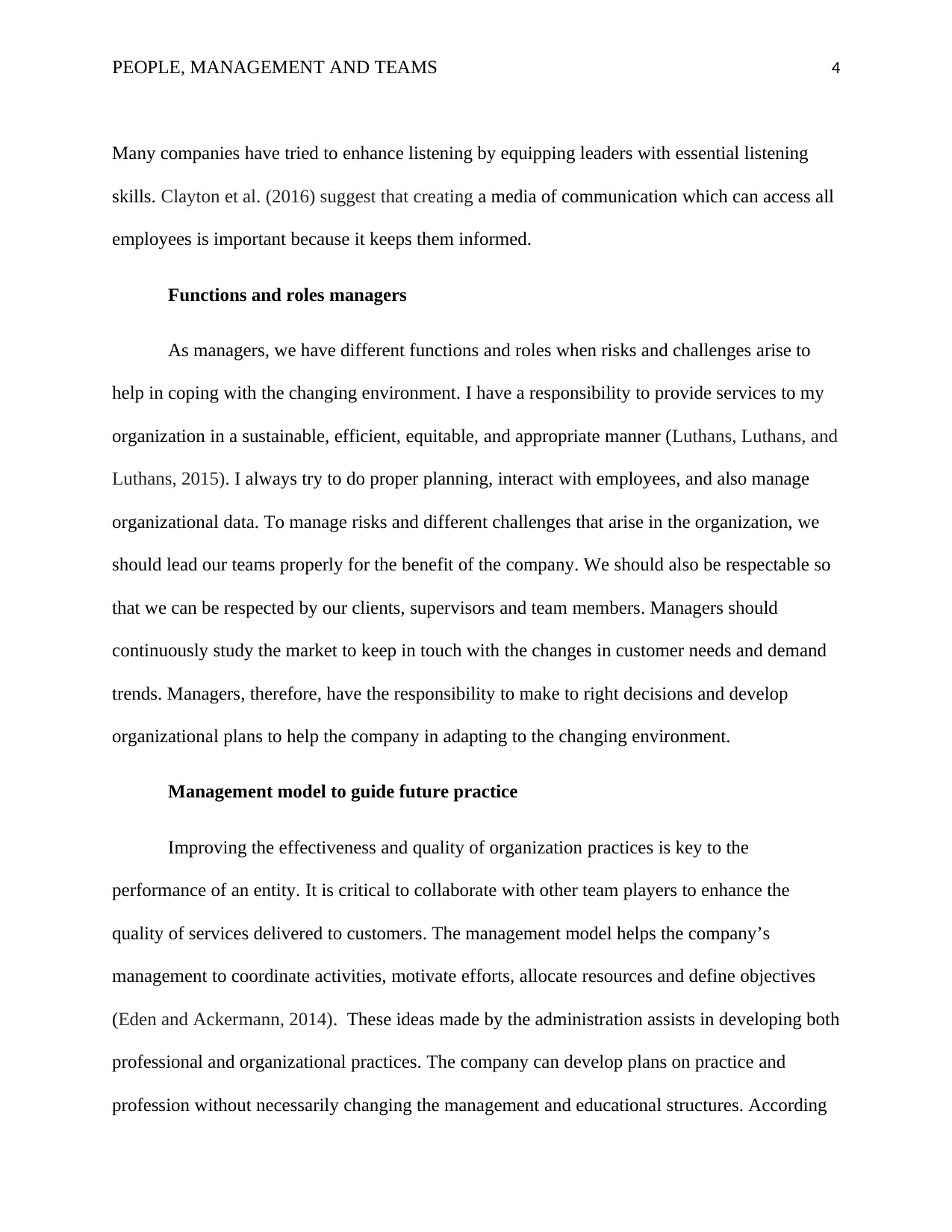
PEOPLE, MANAGEMENT AND TEAMS 4
Many companies have tried to enhance listening by equipping leaders with essential listening
skills. Clayton et al. (2016) suggest that creating a media of communication which can access all
employees is important because it keeps them informed.
Functions and roles managers
As managers, we have different functions and roles when risks and challenges arise to
help in coping with the changing environment. I have a responsibility to provide services to my
organization in a sustainable, efficient, equitable, and appropriate manner (Luthans, Luthans, and
Luthans, 2015). I always try to do proper planning, interact with employees, and also manage
organizational data. To manage risks and different challenges that arise in the organization, we
should lead our teams properly for the benefit of the company. We should also be respectable so
that we can be respected by our clients, supervisors and team members. Managers should
continuously study the market to keep in touch with the changes in customer needs and demand
trends. Managers, therefore, have the responsibility to make to right decisions and develop
organizational plans to help the company in adapting to the changing environment.
Management model to guide future practice
Improving the effectiveness and quality of organization practices is key to the
performance of an entity. It is critical to collaborate with other team players to enhance the
quality of services delivered to customers. The management model helps the company’s
management to coordinate activities, motivate efforts, allocate resources and define objectives
(Eden and Ackermann, 2014). These ideas made by the administration assists in developing both
professional and organizational practices. The company can develop plans on practice and
profession without necessarily changing the management and educational structures. According
Many companies have tried to enhance listening by equipping leaders with essential listening
skills. Clayton et al. (2016) suggest that creating a media of communication which can access all
employees is important because it keeps them informed.
Functions and roles managers
As managers, we have different functions and roles when risks and challenges arise to
help in coping with the changing environment. I have a responsibility to provide services to my
organization in a sustainable, efficient, equitable, and appropriate manner (Luthans, Luthans, and
Luthans, 2015). I always try to do proper planning, interact with employees, and also manage
organizational data. To manage risks and different challenges that arise in the organization, we
should lead our teams properly for the benefit of the company. We should also be respectable so
that we can be respected by our clients, supervisors and team members. Managers should
continuously study the market to keep in touch with the changes in customer needs and demand
trends. Managers, therefore, have the responsibility to make to right decisions and develop
organizational plans to help the company in adapting to the changing environment.
Management model to guide future practice
Improving the effectiveness and quality of organization practices is key to the
performance of an entity. It is critical to collaborate with other team players to enhance the
quality of services delivered to customers. The management model helps the company’s
management to coordinate activities, motivate efforts, allocate resources and define objectives
(Eden and Ackermann, 2014). These ideas made by the administration assists in developing both
professional and organizational practices. The company can develop plans on practice and
profession without necessarily changing the management and educational structures. According
Paraphrase This Document
Need a fresh take? Get an instant paraphrase of this document with our AI Paraphraser
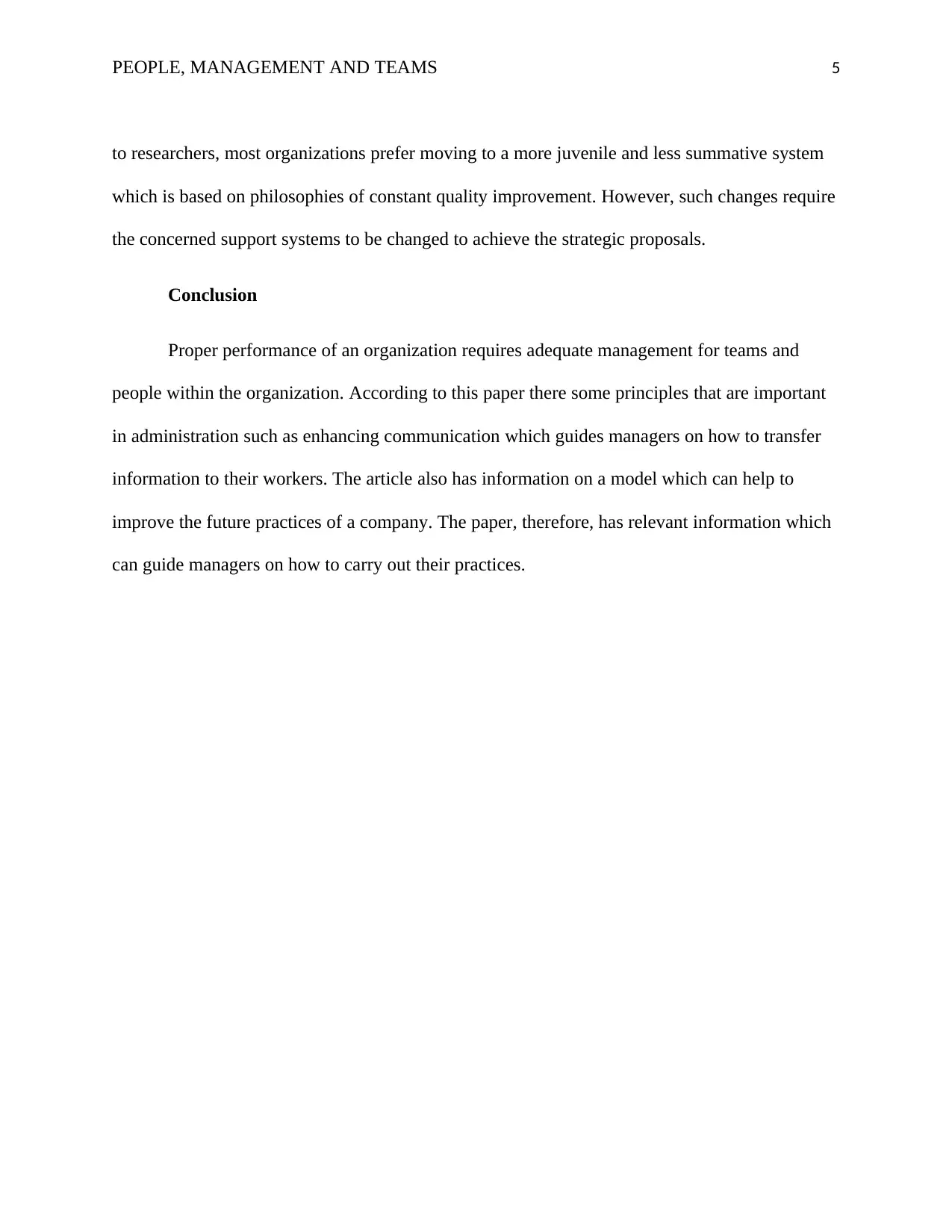
PEOPLE, MANAGEMENT AND TEAMS 5
to researchers, most organizations prefer moving to a more juvenile and less summative system
which is based on philosophies of constant quality improvement. However, such changes require
the concerned support systems to be changed to achieve the strategic proposals.
Conclusion
Proper performance of an organization requires adequate management for teams and
people within the organization. According to this paper there some principles that are important
in administration such as enhancing communication which guides managers on how to transfer
information to their workers. The article also has information on a model which can help to
improve the future practices of a company. The paper, therefore, has relevant information which
can guide managers on how to carry out their practices.
to researchers, most organizations prefer moving to a more juvenile and less summative system
which is based on philosophies of constant quality improvement. However, such changes require
the concerned support systems to be changed to achieve the strategic proposals.
Conclusion
Proper performance of an organization requires adequate management for teams and
people within the organization. According to this paper there some principles that are important
in administration such as enhancing communication which guides managers on how to transfer
information to their workers. The article also has information on a model which can help to
improve the future practices of a company. The paper, therefore, has relevant information which
can guide managers on how to carry out their practices.
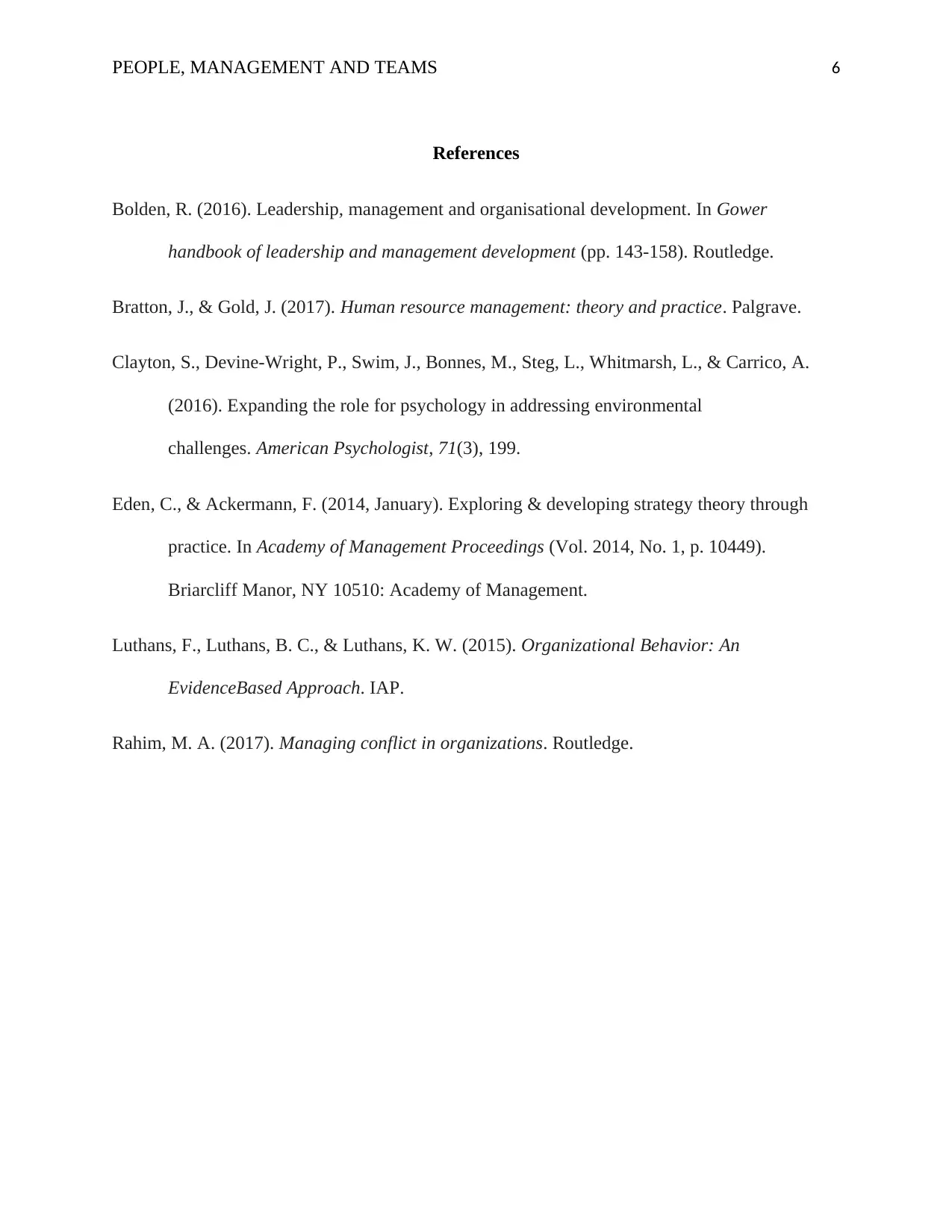
PEOPLE, MANAGEMENT AND TEAMS 6
References
Bolden, R. (2016). Leadership, management and organisational development. In Gower
handbook of leadership and management development (pp. 143-158). Routledge.
Bratton, J., & Gold, J. (2017). Human resource management: theory and practice. Palgrave.
Clayton, S., Devine-Wright, P., Swim, J., Bonnes, M., Steg, L., Whitmarsh, L., & Carrico, A.
(2016). Expanding the role for psychology in addressing environmental
challenges. American Psychologist, 71(3), 199.
Eden, C., & Ackermann, F. (2014, January). Exploring & developing strategy theory through
practice. In Academy of Management Proceedings (Vol. 2014, No. 1, p. 10449).
Briarcliff Manor, NY 10510: Academy of Management.
Luthans, F., Luthans, B. C., & Luthans, K. W. (2015). Organizational Behavior: An
EvidenceBased Approach. IAP.
Rahim, M. A. (2017). Managing conflict in organizations. Routledge.
References
Bolden, R. (2016). Leadership, management and organisational development. In Gower
handbook of leadership and management development (pp. 143-158). Routledge.
Bratton, J., & Gold, J. (2017). Human resource management: theory and practice. Palgrave.
Clayton, S., Devine-Wright, P., Swim, J., Bonnes, M., Steg, L., Whitmarsh, L., & Carrico, A.
(2016). Expanding the role for psychology in addressing environmental
challenges. American Psychologist, 71(3), 199.
Eden, C., & Ackermann, F. (2014, January). Exploring & developing strategy theory through
practice. In Academy of Management Proceedings (Vol. 2014, No. 1, p. 10449).
Briarcliff Manor, NY 10510: Academy of Management.
Luthans, F., Luthans, B. C., & Luthans, K. W. (2015). Organizational Behavior: An
EvidenceBased Approach. IAP.
Rahim, M. A. (2017). Managing conflict in organizations. Routledge.
⊘ This is a preview!⊘
Do you want full access?
Subscribe today to unlock all pages.

Trusted by 1+ million students worldwide
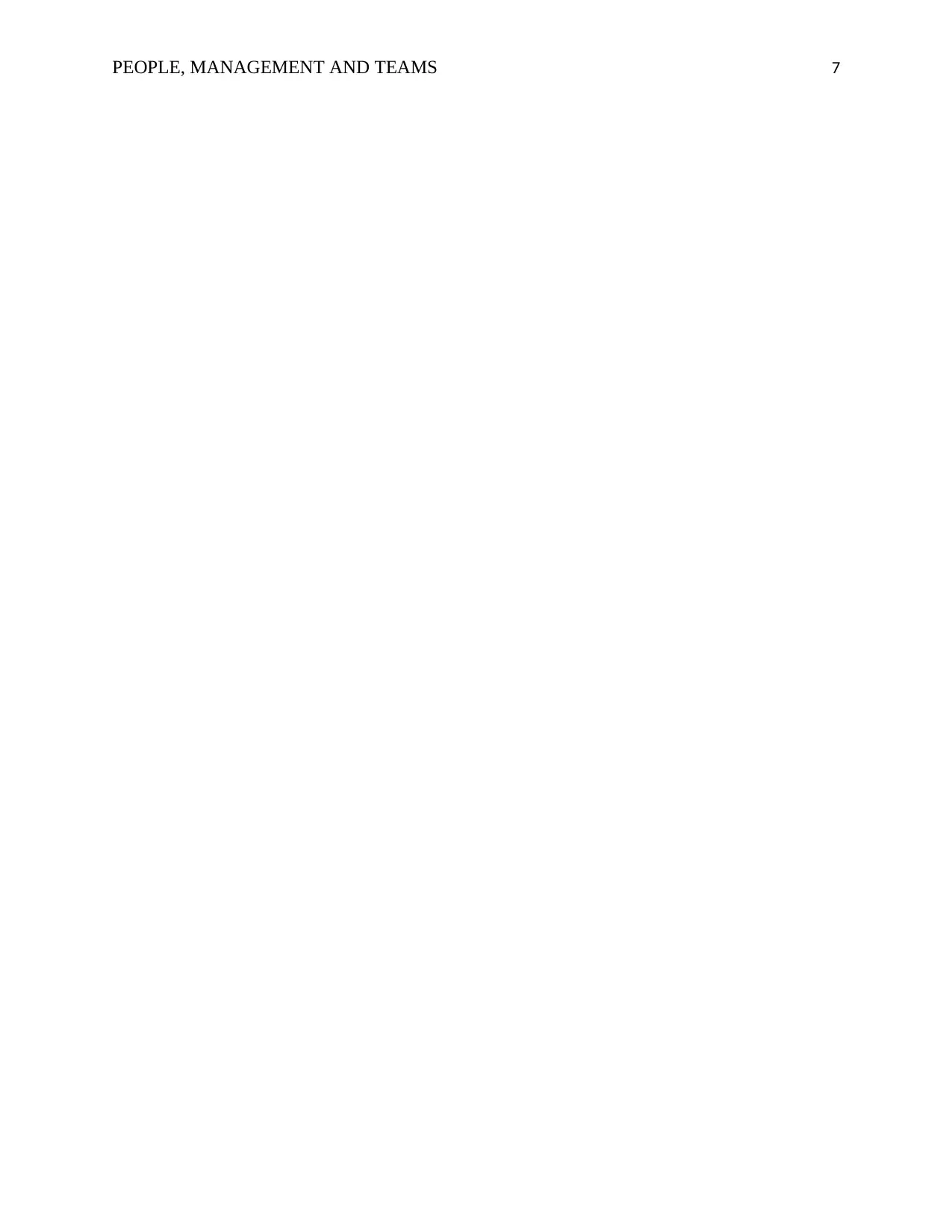
PEOPLE, MANAGEMENT AND TEAMS 7
1 out of 7
Related Documents
Your All-in-One AI-Powered Toolkit for Academic Success.
+13062052269
info@desklib.com
Available 24*7 on WhatsApp / Email
![[object Object]](/_next/static/media/star-bottom.7253800d.svg)
Unlock your academic potential
Copyright © 2020–2026 A2Z Services. All Rights Reserved. Developed and managed by ZUCOL.



